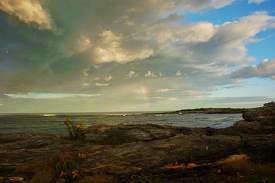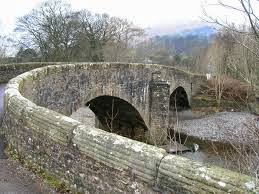In many instances my problems were compounded by the follow-up question, "So what do you do?" Although (as readers will already know!) I will sieze on any opportunity to talk about history, this curiosity seemed to be about the present. With some reluctance I decided to hold back on all our Quaker tapestry panels and how that lady on the English five pound just happened to be a Quaker. Instead it would seem appropriate to observe how Quakers like to be included and will regularly express their views about war. Although this observation may not be fair of all Quakers, this preference for sharing an opinion rather than more mundane methods would seem particularly ironic. Quakerism began as a reaction against preachers who attracted the attention of George Fox because their lifestyle did not suggest they were particularly sincere.
Increasingly I have been reminded of the old English nursery rhyme about the girl with a curl in the middle of her forehead.
"When we are good, we are very, very good,
But when we are bad, we are horrid."
Within Meetings for Worship, throughout our history, and on the social network sites, there would seem a marked tendency for fallings out among Friends. Whereas in other faiths there is so often a proud record of saintly beginnings, our history has to accommodate the story of James Naylor, the Wilkinson-Story controversy involving the same generation of children who kept their meetings alive when their parents were in prison.
Since we have no clearly identified leadership, that "envious spirit" would still seem a particular risk among Quakers. For anyone who has every been stung by other Quakers, there will be times of desperate searching for answers, starting within our own consciences but also about the ways we operate. Time and time again words keep going over in our head,
"Why do we have to be so bad?"
It would seem to me that this problem is made considerably worse through a misunderstanding of our testimonies. That commitment to honesty should I believe begin from within ourselves. It will involve accepting that other people have a different perspective and that our own spiritual journey involves understanding its importance. When Quakers "bash each other about" this process should be seen as being no different from that of any other human being. Forget any previous conceptions that Quakers are entitled to this type of plain-speaking. Such behaviour should I believe be very firmly recognised for what it is- inconsiderate and rude.
When we identify certain individuals as being evil, because we do not agree with their opinions, this is quite the opposite from acting through a belief that there is that of God in everyone. How can we call ourselves peace-makers if the way in which we choose to operate involves cruel selective judgements, ignoring a possibility of common-ground, and an operating process that actively drives people apart? Instead of building bridges, there is no reaching out so we end up with a tower.
Some of our problems may be made considerably worse through the manner in which we listen. Although listening to each other is undoubtedly a good thing, we also need to be aware that what is being communicated is a perspective and that the willingness to listen does not represent an endorsement. Quakers should not be naive in their wish to focus on the brighter side of life. We are not exempt from having our own agendas and these may not necessarily be good ones. In listening to others we need to be aware that defamation of character is a criminal offence, extremely damaging to the victims, and take care not to condone this. Our role as listeners should be to reconcile, drawing a meeting together as Friends. This role will be impossible if we are selective in our choice of evidence and not entirely honest to begin with.
Throughout this blog I am regularly going back to the theme of leadership among Quakers. It would seem to me there is a particular risk in focusing too much upon each other. Our ability to assist and support is limited, and that love which enables us to act like Friends comes from God. It would seem our role should be more about pointing others in the right direction rather than to pretend we as individuals or as an organisation, have everything they need. Since the need to be led is a consistent trait among humans, it would seem crucial that in times of difficulty or dissent among Quakers, we should look to our leadership for guidance.
For those who have ever argued that our Movement is now entirely a gathering of Friends, progressing towards non-theism as our norm, all our decisions should be made democratically, so that instead of looking towards God for guidance, we look towards ourselves, it would seem appropriate to reply that even with a collective opinion, people can make mistakes sometimes.
In the absence of all other hierarchies, and invested with enormous freedom, no wonder Quakers can make a bit of a mess of it sometimes. Our identity is however grounded upon a commitment to truth and the knowledge we have a choice of direction. Whenever we encounter problems within our Meeting, this would seem to me as being an opportunity to re-evaluate our position. As Quakers, we have a responsibility to work for God's Kingdom. Since Christ has come among us as our teacher, what would he do now, to bring Quakers together?


.jpg)




















